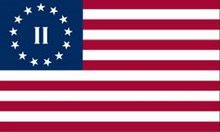First Amendment
Congress shall make no law respecting an establishment of religion, or prohibiting the free exercise thereof; or abridging the freedom of speech, or of the press; or the right of the people peaceably to assemble, and to petition the Government for a redress of grievances.The framers of the constitution desired to restrain the power of the proposed federal government, and created the Bill of Rights, the first ten amendments to the constitution. The First Amendment (along with the rest of the Bill of Rights) was submitted to the states for ratification on September 25, 1789 and adopted on December 15, 1791.
To begin with, the First Amendment forbids the congress of the United States from establishing a state religion, e.g., as England did in their established church, The Church of England, the Anglican Church. Those on the left confuse this with “separation of church and state.” What they really mean is “separation of church and God,” as they want no interference with a God who requires being responsible for our actions.
Secondly, the amendment prohibits the government from restricting the free exercise of religion. This also in misunderstood by the left, as they try to prevent prayers in school, in any governmental operation, forgetting that congress and the supreme court begin the day with prayer.
Thirdly, the amendment prohibits government from preventing the free speech of citizens in pointing out inequities of government, its officials, and even laws passed. Again, the left misinterprets this phrase. It was meant to be applied to free expressions of faith and religion, and in political speech. But, they have extended it to cover the burning of the flag of the United States, to protect pornography, and in some cases libel and slander.
Fourthly, it protects the freedom of the press to correctly and truthfully point out problems with government, i.e., corruption mainly along with false dealings with each other and the taxpayers. The press was given special First Amendment privileges as the “Fourth Estate.” The press was to be a “watchdog” to the government, and not meant to be a “cheer-leader” of it as much of the press seems to be today, overlooking corruption as the government’s ideology seems to be congruent with their own.
Fifthly, the amendment gives the right of the citizens to peacefully assemble in opposition to an increasing government and more taxation, as with the current assemblies of the Tea Party movement. Contrast this with the riots associated with leftist “demonstrations,” in their non-peaceful assemblies, demanding rights not enumerated in the constitution.
Sixthly, the amendment gives the people the right to sue the government for wrongdoing, made illegal in some jurisdictions, and to lobby the government. This originally pertained to individuals, not special interest groups, as it has grown to today.
We need to return to the original intent of the First Amendment, and protect the rights of states and individual citizens against a growing tyranny of the federal government.


Religion. The inefficacy of this restraint on individuals is well known. The conduct of every popular assembly, acting on oath, the strongest of religious ties, shows that individuals will join without remorse in acts against which their consciences would revolt, if proposed to them separately in their closets. When Indeed Religion is kindled into enthusiasm, its force like that of other passions is increased by the sympathy of the multitude. But enthusiasm is only a temporary state of Religion, and whilst it lasts will hardly be seen with pleasure at the helm. Even in its coolest state, it has been much oftener a motive to oppression than a restraint from it.
ReplyDeleteI must admit moreover that it may not be easy, in every possible case, to trace the line of separation between the rights of religion and the Civil authority with such distinctness as to avoid collisions & doubts on unessential points. The tendency to a usurpation on one side or the other, or to a corrupting coalition or alliance between them, will be best guarded agst by an entire abstinence of: the Govt from interference in any way whatever, beyond the necessity of preserving public order, & protecting each sect agst trespasses on its legal rights by others.
But is certain that he proposed an amendment that had the purpose of ensuring that the federal government was subordinated to the politics of religion, for people unfortunately, as proven by the distorted views on this site, find it inconceivable that mankind can enter the kingdom of God in the absence of having the word of the Almighty imposed on them by the creation of his creation.
P.S. - the first two paragraphs were written by someone that has ultimate standing on the subject that is being opinionated by the author of this web page.